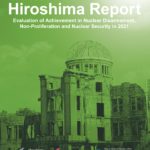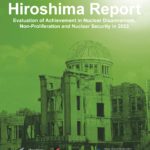4. The United Kingdom ■Nuclear-Weapon State
| Nuclear Disarmament | 27 Points | Full Points 101 | 26.7% |
| Change compared to the Hiroshima Report 2020: -0.6 | |||
| The size of the U.K.’s nuclear arsenal has decreased incrementally. The United Kingdom plans to reduce the number of operationally available warheads to no more than 120, and make a total stockpile of warheads no more than 180 by the mid-2020s. Construction of a new class of four SSBNs, as replacement for the existing Vanguard-class vessels, is underway. However, the delay of the construction due to technical problems and the cost overruns are pointed out. It has not signed the TPNW. Meanwhile, the U.K. has engaged in joint work to develop nuclear disarmament verification measures with the U.S. and Norway, respectively, and participates in the IPNDV. U.K.’s level of transparency in nuclear weapons is relatively high among NWS. It co-sponsored and voted in favor of the UNGA resolution on nuclear disarmament proposed by Japan. | |||
| Nuclear Non-Proliferation | 39 Points | Full Points 47 | 83.0% |
| Change compared to the Hiroshima Report 2020: -2 | |||
| The U.K. acceded to the IAEA Additional Protocol with the provision for complementary access visits. All of its civilian nuclear material is subject to the international safeguards. It has proactively engaged in nuclear non-proliferation, including implementation of export controls. In 2020, it did not submit a report based on the Guidelines for the Management of Plutonium to the IAEA. | |||
| Nuclear Security | 26 Points | Full Points 41 | 63.4% |
| Change compared to the Hiroshima Report 2020: +1 | |||
| The U.K. has ratified all conventions relevant to nuclear security and has introduced recommended measures of INFCIRC/225/Rev.5. The U.K. is also involved in efforts to strengthen international nuclear security, including nuclear forensics and GICNT. | |||






